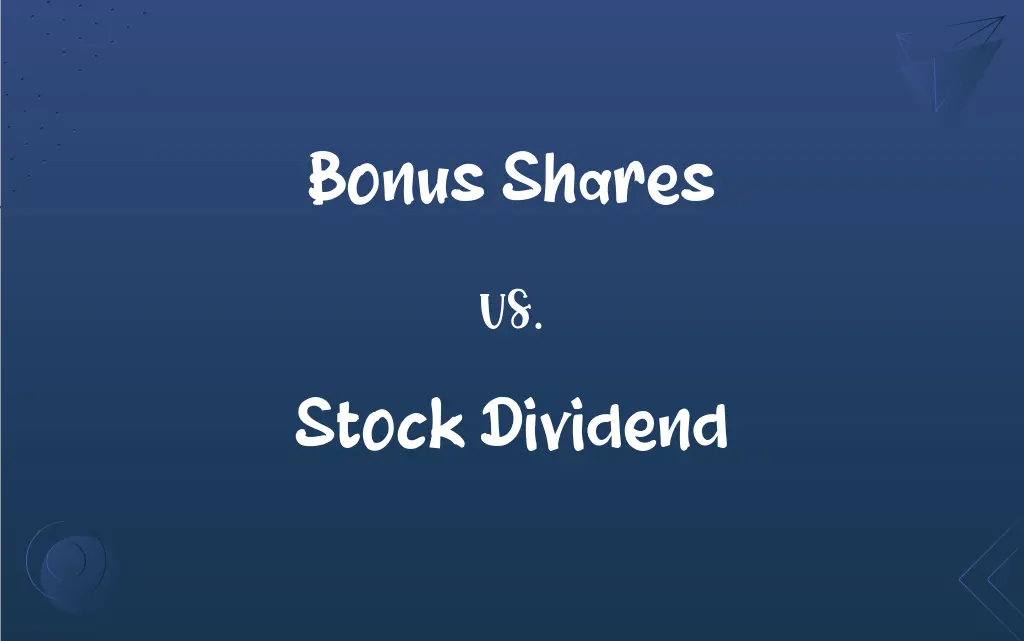Bonus Shares vs. Stock Dividend: What's the Difference?
By Janet White || Published on December 2, 2023
Bonus shares are additional shares given to shareholders at no cost, increasing share count but not value; stock dividends distribute additional shares as a dividend, often optional and taxable.

Key Differences
Bonus Shares are issued by companies to their shareholders from the company's accumulated earnings. They increase the total number of shares while maintaining the shareholder's proportionate ownership. Stock Dividends, conversely, are dividends paid in the form of additional shares rather than cash, reflecting a company’s desire to reward shareholders without reducing its cash reserves.
Stock Dividends can be offered as a choice to shareholders, who may opt for cash dividends or additional shares. These dividends can sometimes have tax implications for the shareholder. On the other hand, Bonus Shares are automatically given to the shareholders and typically don't have immediate tax implications, as they are considered a re-investment of company profits.
Bonus Shares result in a reduction of the company's reserves, as they are issued from retained earnings or share premium account. This issuance dilutes the share price but not the percentage ownership. Stock Dividends, however, are more like a dividend payout, where a company uses its profits to issue additional shares, which can affect the market perception of the company's profitability.
In the case of Stock Dividends, shareholders receive additional shares based on the proportion of their current holding. This distribution can sometimes be fractional. Bonus Shares, in contrast, are typically issued in a fixed ratio to the shares already held, such as 1:10, giving one additional share for every ten held.
While Bonus Shares are generally seen as a sign of company confidence and a reward for loyalty, Stock Dividends offer a flexible way for a company to manage its cash flow while still providing a return to its shareholders. Both impact the company’s share structure but in slightly different ways.
ADVERTISEMENT
Comparison Chart
Source of Issue
Retained earnings or reserves
Profits allocated as dividends
Impact on Shareholder Equity
Increases total share count
Optionally increases share count
Tax Implications
Generally none at issuance
May be taxable, depending on choice
Purpose
Reward loyalty, retain profits
Distribute profit without cash outflow
Typical Method of Distribution
Fixed ratio to existing shares
Proportional to current shareholding
ADVERTISEMENT
Bonus Shares and Stock Dividend Definitions
Bonus Shares
Bonus shares increase share count without additional investment.
The bonus share issuance doubled my number of shares in the company.
Stock Dividend
Stock dividends are an alternative to cash dividends.
Opting for the stock dividend, I received shares instead of cash.
Bonus Shares
Bonus shares are a method of capitalizing company earnings.
My portfolio's value remained the same after the bonus shares were added.
Stock Dividend
Stock dividends distribute company profits as shares.
The 5% stock dividend added several shares to my investment.
Bonus Shares
Bonus shares are additional shares issued to shareholders for free.
The company issued 1 bonus share for every 5 held, increasing my holdings.
Stock Dividend
Stock dividends can be fractionally distributed.
The fractional stock dividend increased my shares by 2.5%.
Bonus Shares
Bonus shares are a reward to shareholders from retained earnings.
Receiving bonus shares was a pleasant surprise, reflecting the company's profitability.
Stock Dividend
Stock dividends offer shareholders a reinvestment option.
I chose stock dividends to grow my holdings in the company.
Bonus Shares
Bonus shares are given to existing shareholders proportionately.
Owning 100 shares, I received 10 bonus shares in the recent issuance.
Stock Dividend
Stock dividends are dividends paid in the form of additional shares.
The company's stock dividend option allowed me to increase my shareholding.
FAQs
What are bonus shares?
Bonus shares are additional shares given for free to existing shareholders.
How are bonus shares different from stock dividends?
Bonus shares are issued from reserves, while stock dividends are a profit distribution.
Are stock dividends taxable?
Stock dividends may be taxable, depending on the shareholder’s choice and jurisdiction.
Why might a company offer stock dividends?
To distribute profits without reducing cash reserves.
What is a stock dividend?
A stock dividend is a dividend paid in the form of additional shares.
Do bonus shares affect share price?
Yes, they can dilute the share price but not ownership percentage.
Why do companies issue bonus shares?
To reward shareholders and capitalize retained earnings.
Can I opt out of receiving stock dividends?
Yes, if the company offers a choice between stock and cash dividends.
How does offering stock dividends benefit a company?
It maintains shareholder satisfaction while conserving cash.
Are bonus shares taxable?
Usually, bonus shares are not taxable at issuance.
What happens to my percentage of ownership with bonus shares?
It remains the same, as all shareholders receive proportional shares.
Are bonus shares a sign of company profitability?
They can be, as they are issued from retained earnings.
How are bonus shares calculated?
They are typically issued in a fixed ratio to existing holdings.
Do stock dividends change the market value of holdings?
They may change the market value depending on market perception.
How does issuing bonus shares benefit a company?
It signals confidence and can retain cash within the company.
Does a stock dividend dilute my ownership?
No, as all shareholders receive additional shares proportionately.
How is a stock dividend ratio determined?
It’s usually a percentage of the current holdings.
Can I sell bonus shares immediately?
Yes, once issued, they can be sold like regular shares.
Is a stock dividend better than a cash dividend?
It depends on the shareholder’s investment strategy and needs.
Can I convert stock dividends to cash?
Yes, by selling the additional shares received as dividends.
About Author
Written by
Janet WhiteJanet White has been an esteemed writer and blogger for Difference Wiki. Holding a Master's degree in Science and Medical Journalism from the prestigious Boston University, she has consistently demonstrated her expertise and passion for her field. When she's not immersed in her work, Janet relishes her time exercising, delving into a good book, and cherishing moments with friends and family.






































































